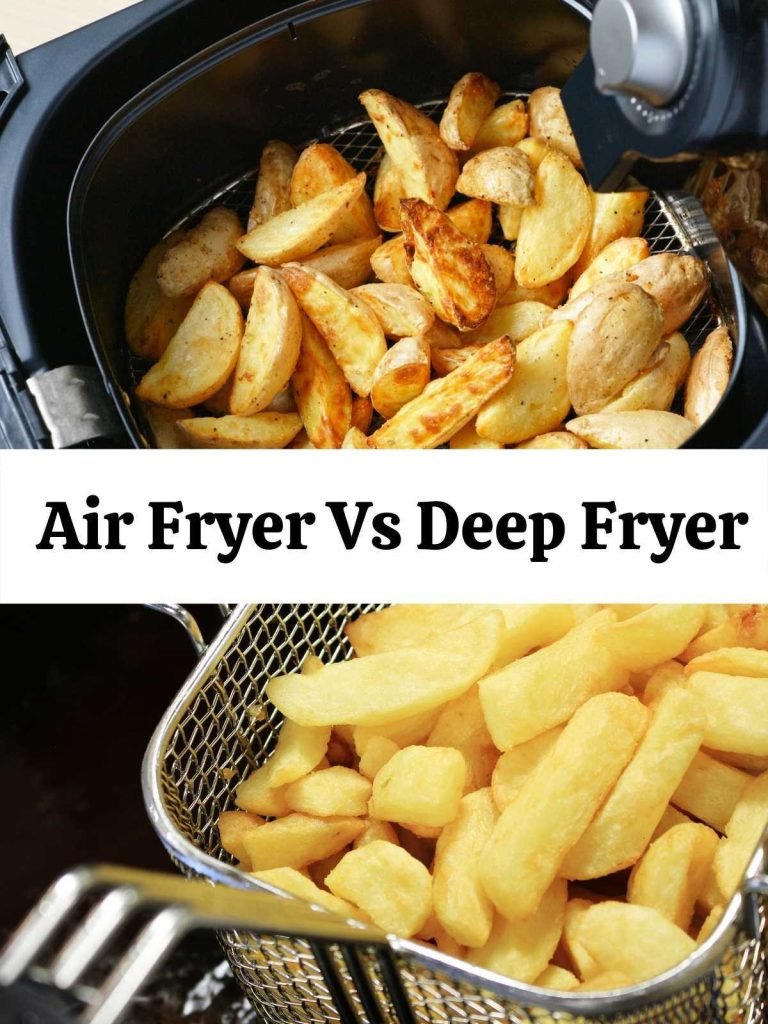Air fryers and deep fryers each have their own appeal, but which one is better for your kitchen? If you’re looking for crispy, delicious food with less guilt, the air fryer might surprise you with its healthier approach. Deep fryers deliver that classic, crispy crunch, but often come with more oil and mess. So, how do they really compare?
In short, air fryers use hot air to mimic frying with significantly less oil, making them a healthier and easier-to-clean option, while deep fryers provide that traditional, intensely crispy texture thanks to submersion in hot oil. Your choice depends on your priorities: health and convenience or authentic fried crunch.
If you’re wondering whether to opt for an air fryer or a deep fryer, understanding their differences can help you decide which appliance fits your lifestyle best. Both can produce tasty results, but they do so in very different ways, affecting the flavor, texture, and healthfulness of your favorite dishes.
How Do Air Fryers Compare to Deep Fryers
Cooking Method and Technology
Air fryers cook food by circulating hot air around it, creating a crispy texture similar to frying but without submerging food in oil. They use rapid air technology, which results in evenly cooked dishes with less fat. Deep fryers, on the other hand, submerge food in hot oil, cooking quickly and producing a traditional fried texture. The main distinction is that air fryers rely on convection heat, while deep fryers use oil as the cooking medium.
Health and Nutrition Benefits
One of the biggest advantages of air fryers is their ability to prepare crispy foods using minimal oil, often just a tablespoon or less. This significantly reduces calorie intake and saturated fat consumption, making them a healthier option. Deep fryers add a lot of oil to the food, which can increase cholesterol levels and calorie content. Choosing an air fryer can help maintain a balanced diet, especially if you enjoy fried foods frequently.
Cooking Time and Efficiency
In general, air fryers cook food faster than traditional ovens and sometimes quicker than deep fryers for certain items. They heat up rapidly and cook evenly thanks to the circulating hot air. Deep fryers often require heating oil to high temperatures, which can take longer initially but cooks food rapidly once the oil reaches the desired temperature. For quick snacks or small meals, air fryers are often more convenient due to their shorter preheating times.
Food Texture and Quality
Both appliances produce delicious crispy results, but the texture can differ. Air fryers tend to produce a lighter, less greasy crust, which many people prefer for healthier eating. Deep fryers create a dense, crunchy exterior with a moist interior, ideal for classic fried foods like fried chicken or donuts. The choice depends on your preference for a lighter or more indulgent texture.
Ease of Use and Cleaning
Air fryers are generally straightforward to operate, with simple controls and adjustable temperature and timer settings. Their parts are usually dishwasher safe, making cleanup easier. Deep fryers can be messier because of oil splatters and the need for careful filtering or disposal of used oil. Cleaning a deep fryer often involves more effort due to the oily residue and the need to safely handle hot oil.
Cost and Maintenance
Prices for air fryers vary widely, often ranging from budget-friendly models under $50 to premium designs over $200. They require minimal maintenance, mostly regular cleaning of the basket and tray. Deep fryers can be more expensive initially and also require ongoing expenses for oil supplies. Over time, the cost of buying and disposing of cooking oil can add up, making air fryers a more economical choice.
Safety Considerations
Air fryers are generally considered safer because they don’t involve hot oil, reducing the risk of splatters and burns. They also have automatic shut-off features in many models. Deep fryers pose safety risks due to hot oil, which can cause severe burns if spilled or splattered. Proper handling and supervision are essential when using a deep fryer to prevent accidents.
Environmental Impact
Using less oil makes air fryers more environmentally friendly because they generate less waste and require fewer resources. Deep fryers contribute to higher energy use due to longer preheating times and oil consumption. Disposing of used cooking oil can also have environmental implications if not done properly, whereas air fryers produce minimal waste.
Ideal Food Types for Each Device
Air fryers excel at cooking foods like vegetables, chicken wings, French fries, and even baked goods with less oil. They are versatile enough for reheating leftovers and making snacks. Deep fryers are better suited for foods traditionally fried, such as tempura, fried fish, or crispy chicken cutlets, where a rich, greasy crust is desired.
Size and Kitchen Space
Air fryers are more compact, making them perfect for small kitchens or for those who want additional cooking appliances without clutter. Deep fryers tend to be bulkier, requiring more counter space and proper storage. Consider your kitchen size and storage options when choosing between these appliances.
Summary of Pros and Cons
| Feature | Air Fryers | Deep Fryers |
|---|---|---|
| Healthiness | Use less oil, healthier | Use more oil, higher fat content |
| Cooking Speed | Fast and efficient for small items | Very quick once oil is hot |
| Texture | Lighter, less greasy | Crispier, traditional fried texture |
| Ease of Cleaning | Simple, dishwasher safe parts | Messier, oil disposal required |
| Cost | Affordable to premium options | Often more expensive initially and ongoing costs |
| Safety | Safer, no hot oil risks | Potential burn hazards with hot oil |
| Environmental Impact | Low, less waste and energy | Higher due to oil use and disposal |
Additional Considerations
While comparing air fryers and deep fryers, think about your dietary preferences, kitchen space, and cooking habits. If you prefer healthier meals and want quicker cleanups, an air fryer is an excellent choice. For traditional fried foods with authentic texture, a deep fryer may suit your needs better.
Choosing between an air fryer and a deep fryer depends on your health goals, taste preferences, and kitchen setup. Both appliances can produce tasty results, but their differences in cooking method, safety, and cost make each suitable for different lifestyles. Understanding these factors will help you select the best device for your needs and enjoy delicious, crispy foods with ease.
Everything You Ever Wanted to Know About Deep Fryers vs. Air Fryers | Good Housekeeping
Frequently Asked Questions
How does the cooking time of air fryers compare to that of deep fryers?
Air fryers typically cook food faster than traditional deep fryers because they use rapid air circulation to cook evenly and quickly. While deep fryers submerge food in hot oil, which can take longer to heat up and cook through, air fryers often reduce cooking times by about 20-30%. This efficiency allows you to prepare crispy dishes in a shorter period without compromising on texture.
In what ways do the flavors of food prepared in air fryers differ from those cooked in deep fryers?
Foods cooked in deep fryers usually have a richer, more authentic fried flavor due to the immersion in hot oil, which enhances the crunch and taste. Air fryers produce a crisp exterior using hot air, resulting in a slightly lighter flavor profile. Although the texture can be similar, some people notice that air-fried foods have a less greasy taste compared to traditionally deep-fried items.
How do the health implications compare between using air fryers and deep fryers?
Air fryers are generally considered a healthier option because they require significantly less oil, often just a light spray or minimal oil for cooking. This reduction in oil consumption decreases calorie and fat intake, which can benefit overall health. Deep fryers, on the other hand, involve submerging food in oil, leading to higher fat content and calories, which could impact health if consumed frequently.
What are the differences in cleaning and maintenance between air fryers and deep fryers?
Cleaning an air fryer is usually simpler because it involves washing a removable basket and tray, which are often dishwasher safe. Deep fryers require more effort since they involve handling hot oil, cleaning the oil reservoir, and ensuring no residue is left behind. Oil disposal can be messy and needs careful management to prevent spills or odor. Overall, air fryers offer a more convenient and less time-consuming cleanup process.
How does the energy consumption of air fryers compare to that of deep fryers?
Air fryers generally use less energy than deep fryers because they heat up quickly and cook food faster. Since they operate with a compact heating element and circulate hot air efficiently, they typically consume less electricity per cooking session. Deep fryers, especially larger commercial models, often require more power to keep large quantities of oil hot, leading to higher energy consumption over extended use.
Final Thoughts
Air fryers use hot air to cook food with minimal oil, making them healthier and cleaner. Deep fryers, on the other hand, produce crispier textures through submersion in hot oil.
While air fryers heat up faster and are easier to clean, deep fryers excel at achieving traditional fried textures.
In conclusion, how do air fryers compare to deep fryers? Air fryers are healthier and convenient, but deep fryers deliver authentic crispy results.
As an Amazon Associate, We earn from qualifying purchases. When you purchase a product through Amazon links on kitchenadvising.com, we may earn a small commission at no extra cost to you. This helps support the site and keep our content free.


